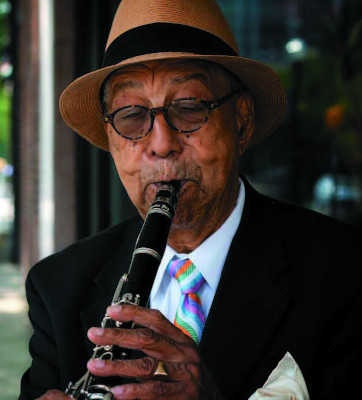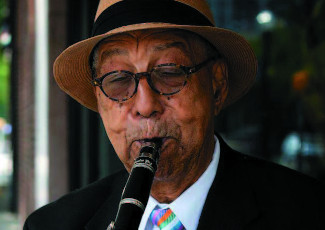
Dr. Frank Eaton Adams, Sr. was born on February 2, 1928, in Birmingham, Alabama. Adams was an accomplished jazz musician, playing the clarinet and alto sax with a style and tone that was clear and instantly recognizable, but above all he was an educator and mentor. He played with some of the greatest jazz musicians to ever perform including Duke Ellington, Erskine Hawkins, Tiny Bradshaw, Lucky Millinder, and Sun Ra.
In 1950, he took a temporary teaching position at Lincoln Elementary School in Birmingham, Alabama. His plan was to rejoin the Duke Ellington Orchestra when they returned from a European tour, but he quickly discovered a passion for teaching and mentoring. Shortly after Adams started teaching, he was offered a permanent spot in the Count Basie Orchestra, but he turned it down, choosing to remain instead in the classroom. He remained at Lincoln for 27 years, and then became the Birmingham City Schools Supervisor of Music for another 20 years, shaping the lives of thousands of youth over his lifetime. In 1978, Adams was inducted as a charter member of the Alabama Jazz Hall of Fame and eventually became its Executive Director.
Adams grew up in the Smithfield neighborhood of Birmingham and was introduced to music early. His father, Oscar Adams, Sr. had been a trombonist for W. C. Handy’s Alabama A&M University orchestra, and his older brother Oscar Adams, Jr. played clarinet. While attending Lincoln Elementary, Adams was a student of William Handy, nephew of W.C. Handy. At Industrial High School, he was a student of Fess Whatley. In high school, Adams played in Whatley’s big band, performing across the South. He later joined a second big band led by his former schoolmate, Sonny Blount (later known as “Sun Ra”). In 1945, Adams enrolled at Howard University in Washington D. C. and founded the Howard Swingmasters, the school’s first jazz band. He graduated in 1949 and began playing for some of the giants of jazz, but he didn’t abandon his passion for learning, continuing his education with a series of degrees up to his PhD in education.
In 1950, while waiting to rejoin the Duke Ellington Orchestra, Adams took a temporary teaching position at Lincoln Elementary, replacing his former teacher William Handy. Adams quickly realized that his calling was in teaching. In his 27-year career at Lincoln Elementary, he produced numerous top-rated school bands.
During the civil rights era, Adams led the integration of band competitions in segregated Birmingham. In 1963, during the children marches, Adams would turn his back to write on the chalkboard, allowing his students to slip silently out of the room to participate in the marches. He would follow from a short distance to make sure they were safe. He stated, “These, after all, were band children, you couldn’t stop them from marching.” During his 20-year stint as Supervisor of Music for Birmingham City Schools, he instituted a Strings Program in the schools, putting new and recycled instruments into the hands of hundreds of music students.
Adams joined the Birmingham Heritage Band in 1976 and later performed with the Alabama Jazz Hall of Fame All-Stars. He was a featured soloist in the 313th Army Band. From 1997 to 2001, he served as the Executive Director of the Alabama Jazz Hall of Fame, and for many years until his death he served as its Director of Education Emeritus, orchestrating an annual Student Jazz Band Festival, and providing free jazz classes every Saturday morning.
Adams passed away on October 29, 2014.
Resources
-
Doc: The Story of a Birmingham Jazz Man by Dr. Frank Adams and Burgin Mathews
-
Weld for Birmingham http://weldbham.com/blog/2014/11/11/remembering-doc-adams-birmingham-jazz/


